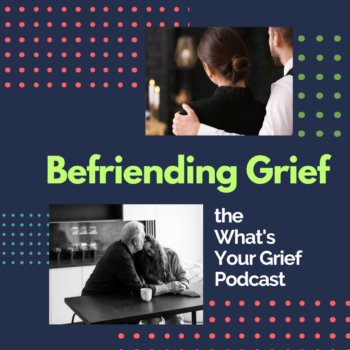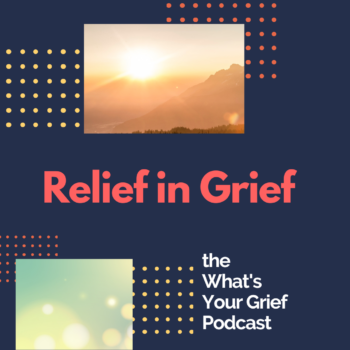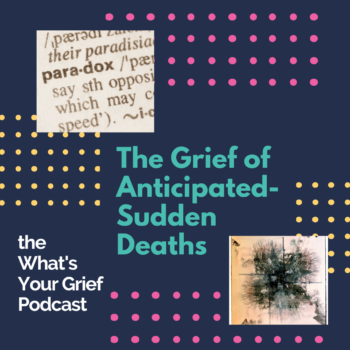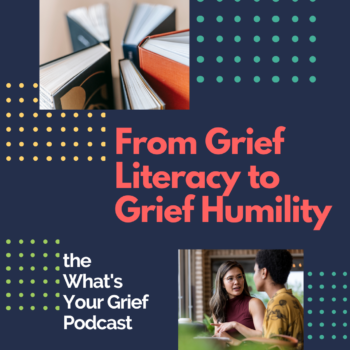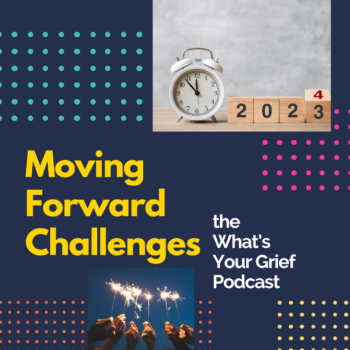The Griefy-est Time of the Year
/ What's Your Grief Podcast : Litsa Williams
The What's Your Grief Podcast: grief support for those who like to listen.

In this grief podcast, Eleanor Haley, MS and Litsa Williams, MA, LCSW-C, the mental health professionals behind the website and book 'What's Your Grief', leave no stone unturned in demystifying the complicated and messy world of living life after loss. One digestible topic at a time, Haley and Williams distill topics ranging from grief theory to coping. Grief is sad and confusing, but your grief support doesn't have to be. You can listen here by using the player above or listen and subscribe wherever you get your podcasts.
Below we have provided a transcript of the episode.
Hey Litsa, how's it going?
It's going all right. How are you?
I'm good. So, we're back with the What's Your Grief Podcast. Yet again.
Yet again, we'll spare rehashing all the history of our on and off background of the podcast.
Right. But the important thing is we're here now, right.
Exactly.
Exactly. We're here. It's the holiday season, so what better time than to come and talk about grief, right.
Yeah. I mean, it, it does seem like the griefiest time of the year.
Yeah. That's (that's) such an interesting way of putting it.
It's so true. I think that, there's, and it does just seem like a lot of the weight around the holiday season. It is that combination of a lot of joy and a lot of sad and that has (has) always been true. It's just, I don't know, in some of the messaging for whatever reason, I think, we internalize it differently. Like, we internalize it like we're supposed to be…
Yeah.
...happy, even though there is a lot out there that shows the reality that, like, this is actually a really complicated time of year.
Well, you know, we talk about values all the time, right. And how the things that we value the most in life are a place where we can experience the most purpose and meaning and connection and joy. But they're also the places that we care about the most and so they're the places where we can experience the most pain and loss and hurt. And so, I really think that so many things about the holidays are things that we value very deeply. And this is going to be different for everybody, but if you think about like the list of things that are associated with the holidays like tradition, family, faith, just are kind of the threads that connect us to the past. All sorts of different things are things that we, as humans, tend to value very deeply, so it makes sense that there would be this space for immense joy and also immense loss and pain. But we don't always acknowledge that pain side of it for a wide range of reasons, I suppose.
Yeah. I mean, a wide range of reasons I suppose but also I'm not really sure exactly what those wide range of reasons are, interestingly, when I really think about it.
I mean, I think that we grow up, not everybody obviously, like we all have different childhood experiences, right. But we have this idea of like childhood holidays are all about the coziness and the comfort and the warmth and the presence of, to some extent depending on what families do, and about being together, and this is obviously not everybody's experience, right. But I do think we often have this picture. And kids, I think at the holidays tend to be kind of shielded from the more sad things.
Yes, yes. That is definitely the case. And I certainly, I have, the (the) older that I get, the more I think about that, and the more I reflect on how many holidays in my own childhood my parents were probably, for (for) reasons I'm very aware of now, really grieving and really probably struggling in a lot of ways. And they definitely did not let us see that. Or they were working really hard to make sure we weren't aware of that. I (I, I) recognize that so much and I see it now as an adult, as very much, like, I don't know, a double-edged sword or like a, you know. It is part of what made many holidays wonderful in my childhood. But also part of maybe sustaining this false expectation that the holidays are always supposed to just be these happy, wonderful occasions that are all about joy and family and togetherness.
Yes. I, and I don't know what it is why we carry that assumption that it's supposed to be positive into adulthood. Because I relate to what you said so deeply. I think about this all the time because I know that my mom was grieving, probably quite intensely, during my childhood for her own mother. And then I know that my mom had a lot of the similar stresses and worries, like for example that I have now, about like money, and making sure the kids have a good holiday, and taking care of all the many things that need to be taken care of for your immediate family and extended family over the holidays. So, I know that there was, like, that burden and there was that wide spectrum of feelings and emotions going on. But I (I) never, like you said, knew that as a child. When we get to adulthood we do begin to realize this. But I think we still buy into this assumption that things are supposed to look a certain way. And I'm not (I'm not) sure why we we do that. I think our society, in general, kind of has that don't be a Grinch, you know. Let's be Rosie and Mary and focus on the things that really matter. And those are important messages. Like, I do agree. Like, let (let, let) us focus on the values at the heart of our holidays and our celebrations. Like, that those things are (are) important. But, yeah. Why does that then make us feel like we can only bring one half of that emotional spectrum into the (into the) holiday season. I'm not really sure, because we know it's a mix. We know that. We all know it, you know.
Yeah. And that (that), I (I) mean, I guess it's that ultimately, right we live in this culture and society that would rather pretend that happiness, like full happiness is attainable on these sorts of special days, or maybe just in general, than saying like Wait authentically capturing that these holidays often reflect the full range of human emotion is (is) valuable. I think we (we) would rather say like, no we want to pretend and make it all happy, rather than authentically convey that it's a mixed bag.
Right. And as you're saying, that I was thinking like even when we do (do) the thing where we connect to what matters, right. Togetherness and generosity and faith. Even those values are a mixed bag, right. Even those values are a combination of happy and sad, pain and and pleasure, for lack of a better word. And I think nowhere do we see that more than we see it with connecting with (with) people and memories of the past and people who've died because that is something that I think is value for many of us who are grieving at the holiday season, that is that mix of things that feel quite comforting for many people, and also at the same time it feels very sad. And I think that's how a lot of our values really are as as they should be. A lot of the things that are at the heart of this season. So (so) yeah, I think it is interesting that we don't acknowledge that. I think maybe to some extent in the same way that we protect our, protect the little ones, maybe from hardship. We try to protect ourselves during this time of year. And we are very nostalgic often and connected to the things that we remember being so excited about and bringing us so much joy. And, so I think, maybe that is a little bit because we are connecting to that previous chapter where things did feel really positive. Does that make sense, or am I just.
Yeah. No, I mean, I think it does make sense. And I think I've (I've) thought about this (this) year quite a bit around Thanksgiving, because I think my memories of Thanksgiving, I have really really positive memories of Thanksgiving in my childhood and my teenage years, like, really good associations. And then (and then) I have really terrible associations with Thanksgiving in my 20s, really. I, there was just everything radically changed in my life. There my, certainly my dad died when I was 18, but then there was a string of subsequent losses in my family, other deaths of, you know, (my grand) both my grandmothers, and then extended family members, so that Thanksgiving changed so dramatically in my family. Everything looked different and I think I sort of swung to this other extreme where after that happened, I was kind of like, Okay I just need to plan for Thanksgiving to always be awful. Because I was like, I can't, it's never going to be what it was. Like, it's never going to be this really idyllic memory of my childhood. And so, if I keep setting myself up for trying to feel that again, or recreate that again, then I'm just setting myself up for failure which sounds really pessimistic and depressing. But I think is kind of how I've (I've) coped with Thanksgiving over the years.
Well, right. I mean that (that) I think, we all, I think a lot of us do that, right. If it can't be the way it was, if it can't be this picture then I don't I don't necessarily see the value in it or want it. And so, I do think a question we often have to ask ourselves, and sometimes maybe we're not ready to ask that question is Where's the value if it's not that plan A. If it's not that ideal picture, where is the value. And what (what) is going to feel comforting still or pleasant and allow me to connect with the value of the day. And sometimes we're just not, we're just not ready for that or we don't want to do that and that's okay too. But I (I) do think that that kind of like goes along with this idea of (of) wanting things to be the way they were, right, and when they (when they) felt really good.
Yeah.
It's just never (it's never) going to be like that again, you know. Cuz we're grown-ups now, and it's different. And people we love are not here anymore, and that sucks. I want to be (I, I want to be) eight years old again for (for) a day.
Rright.
Where I was being sheltered. Even though I look back, and I'm like Oh I, I'm, I feel (I feel) sort of sad to realize that my parents were sheltering me from so much. But at the same time, it did create wonderful, certain wonderful memories. And (and) I guess to be slightly more optimistic, I mean this year I actually had a (a) nice Thanksgiving when I had braced myself for not a nice Thanksgiving because that's what I often do. And I was reminded that sometimes the lead up to difficult holidays is much worse than the day itself. And that there is a space to be able to really have things that we value and appreciate even if they're not exactly the way they used to be. And we can find that gratitude and do all the things that we like of course always talk about. But it can be really hard in the moment to tap into.
I, yeah, for sure. I think it (it) is really hard and we talk a big talk but like then in our regular lives, you know, we're just a mess, just like everybody else, right. We can tell everybody Find the, you know, find the middle ground, Find the value, but it's hard. Like you said, it is really freaking hard. But I think, like you (like you) were describing Thanksgiving as being a really meaningful holiday to you, so I feel like when something is really meaningful it's worth continuing to try, you know. There are other holidays where people might not have really cared that much. Like, maybe it's a Valentine's Day. Oh we never made a big deal and now it's making me feel really crappy acknowledging this day. Well if it was never a big deal to you, then it's okay like don't (don't) worry about it, you know. Just, you know, shut your door, stay inside, turn off the TV, read a book until the days pass. But when it's a day that really does matter to you, when you're ready to try and connect and find ways to make it yours again or your family's again, I think it's it's worth trying to find that middle. But I think, having that mature perspective where you recognize that it's going to be that mix. It's gonna be (it's gonna be) different and it's going to be a mix and it's going to suck at times perhaps. But maybe there are times that are going to feel okay as well. And that's going to be an improvement from all these other years where it really was (was) all bad.
Yeah. And I think, part of it that's so hard, because as you described there is that nostalgia or yearning or that idea of (of) what it used to be or comparing it to. And I think sometimes trying to go into these days with a little bit less of that, of certainly knowing there may be traditions we want to hold on to and values that are really important, but being able to say I'm gonna take this year as it comes, of the good things for the good things and everything else, you know, to just kind of leave it. But to get out a little bit of that comparing cycle, which is hard. Because it's like ultimately the holidays are this specific reminder of like what it (what it) used to be and who used to be there and all, you know, all these specifics.
It's (it's) really weird. It's like being asked to relive a day over and over again every year. But (but) it's different. It's the same but different. And so it is impossible, I find personally. I'm a very nostalgic person. Like, I, half my pages I follow on Instagram are just 90s and 80s Nostalgia pages and on Facebook the only posts I ever get are posts about old houses and like I (I), so maybe I'm just speaking from from like me. But like, I feel like it is impossible not to be drawn back into the past, especially when you're grieving, right. You get out that box of ornaments you're going to pick up your loved one's favorite ornament, right. And you're gonna think of them, you know.
Yeah, totally.
Impossible not to get drawn into the past this time of year.
Well, and what's complicated is that I think that that's true even when the past isn't idealized in romance, right.
Right.
Like, it's like the worst, it's like on the one hand there are the really wonderful great memories that we get drawn to but then sometimes it's that the holidays weren't that for us. Like, they were awful and we have terrible memories of really difficult things at the holidays. And the holidays are still inviting us to relive those things over and over again and be reminded of them. And now, sometimes to feel like instead of trying to recreate them, we're trying to like undo and reclaim the past by making it perfect now which creates its whole own other set of pressures.
That's (that's) so true. I think, you know, I'm thinking about people who talk about how they experienced a lot of loss around the holidays, also about people who never ever ever had a good holiday. Like, we can grieve things we never had. And so as we grow older, we can continue to, you know, go through certain holidays, it doesn't even have to be winter holidays it could be any holiday, birthday, whatever. And those holidays can remind us of what we didn't have and wish we had. So absolutely, I think, it can be something that brings you back to more positive memories, and something that brings you back to more negative memories. And there's not, like, it's just, it is a thing, you know. It is a thing and (and) for many people, they don't want to not do it, you know. I don't want to not do it. There's a reason why I do connect so much whenever I can with the past because I, it makes me feel comfort and warm and happy feelings, for me personally. But (but), yeah, sometimes we need to kind of find ways to cope when maybe we're doing it too much, or it's making us feel bad about what we have in the present, or when like you were describing it it's kind of like haunting us in a way.
Yeah. And I think, being able to say How do we exist in (in) the present, right. Of how do we exist in this present moment, not trying to recreate something that's gone, not trying to put pressure on ourselves to create something perfect that we never had as a mark that we've moved beyond our difficult past, how do we instead just kind of figure out what (what) we need in a way that's going to acknowledge that there's going to be wonderful things, there's going to be sad, hard complicated things, and how do we stay present and authentic and connected and take care of ourselves within all of that. I mean, I think that's really
Yeah.
the hard work of the holiday season is to create space for all of that, right.
And I (I) think that one of the things that is hard for, it's hard for us to talk about, like, How do you spend the holidays, How do you take care of your holidays, How do you, you know, what should you do over the holidays, because it (it) is going to just be so unique to the individual. It (it) depends on the holidays that they celebrate. It depends on how they feel about the holidays. It depends on on how (how) they felt in the past and how they feel in the present, it depends on a hundred different things. And so there are going to be people who say Nope, I'm not going to try that find that middle ground. I'm just not gonna do it this year. And that is a choice. That ,that's fine to make for people. But on the other end of the spectrum, we want to recognize there are plenty of people who are like What are you all talking about, the holidays are like the one respite I have. The one thing that I have to look forward to. The one thing that brings me joy in this grieving life that I have. I I don't want them to, I don't want to look at them as though they're going to be negative. Because that's not how I'm feeling, right. There can be a bit of a denial in that sometimes, where we kind of put our heads down and say This is gonna be fine. It's gonna be perfect. There can be a bit of a denial and sometimes when we do that but sometimes it's just it still feels good to us. Yeah. Too, if you're on that other end of the spectrum.
Absolutely. Like, I think that we need respite from our grief. We need distractions from our grief. We need to find those things in our lives that still give us a sense of joy and wonder and meaning and purpose. And if the holidays are that for you, like one, I'm just really happy for you. But also, like, to be able to just feel grateful for that, and to let go of any guilt that might be going with it. Because I think sometimes, we feel guilt about the idea of enjoying life when this person or people who we've lost aren't here with us. I think, this year in the world there is so much complicated that we are seeing of the pain that people are, experience all over the world, that we all know theoretically is always there. But this year, because of the things that are happening in Gaza and in Sudan and the media cycle where we're being fed so much all the time, we can feel feel this guilt for enjoying the holiday. Or for it, for kind of feeling this idea of this is the most wonderful time of the year. And it can be so important,
Yeah,
to remember that like our pain is not our connection to the people who we've lost. We have so many connections to them. And when we enjoy the holiday season, it doesn't mean we're forgetting them or leaving them behind or betraying them in some way. It means that we're learning how to carry both our grief alongside with our (our, our) life now, and what we value and appreciate. And we can also recognize all of the pain that exists in the world. And sometimes, when we're able to actually better regulate ourselves and we're better able to kind of manage our own grief and manage the holiday season in positive ways, it helps us to be able to think about what are the productive and helpful things that we want to do in the world in service to other people and to feel like we're making a difference and contributing in the ways that feel important to us. That can all be wrapped up in our holiday season where we're still very much kind of thinking of others and (and) giving and aware of what our relationship is with the world as a whole. So, I think it's important to give ourselves permission to feel just the full range of feelings that might be coming up.
Yeah. I mean if (if) there was one, like thesis of this podcast, it would be that. Like, whatever you're feeling, is (is) okay to feel. Wherever that range of emotion, wherever you are on that range of emotion at any given time. Because it's going to change possibly, you know, from moment to moment at times. And so, it is okay if you are somebody who's saying like I can't do it this year. It is okay if you're somebody who's like I really want to enjoy the holiday season. And maybe, you know, I have moments of grief but I'm gonna focus on, you know, gathering or buying presents or whatever. That's okay too. And then if you're like a lot of people who are kind of in that middle, where it's like, I'm trying to connect with the things that bring me joy and comfort while also acknowledging that I'm experiencing a lot of grief. That's (that's) okay too. Like, they're all okay. And feeling what you're feeling is okay and nobody can tell you not. No one can take that away from you. No one else's opinion, no one else's pain, no one else's happiness or (or) desire to be happy can take away how you actually feel. I will say this might be a tangent. This might be a tangent. But I've been thinking about this. Sometimes how I feel, I don't like, you know. Sometimes how I feel, especially lately I've noticed, and I (I) think it's because I am feeling very pulled towards the past while also being pulled towards the future and stressing about the holidays, it is making me very impatient and snappy and irritable. And I've been thinking about this a lot, because I don't know that when I'm in distress my default is like sadness. I feel like sadness can (can) get a lot of understanding and compassion but when you're just being a kind of jerky,
Yeah.
You're not you're making it really hard for other people to be there for you. And you're also making it hard for other people in general. So I will say, that sometimes what I'm feeling, I want to acknowledge and try to make a different choice in terms of reaction, you know.
Yeah. It's like that response versus reaction thing that we often talk about. Like, sometimes our, you know, initially I think because there is so much stress that can come up at the holiday season and emotion and all of this, that yeah, that initial reaction that comes out can sometimes be frustration and impatience and, you know, all of these different things. And it does take that extra effort to pull back and go Okay, wait a minute. How is this reaction serving me. How is it helping me. How is it harming me. What do I want to do differently with it to try to sometimes shift it a little bit.
Yeah. And I think in this instance, like, a good question for me to ask myself personally is, Is this cutting me off and getting in the way of me connecting with the holidays and the people I care about. And I (I) think in this instance the answer is Yes. And so I (I) have had to have that conversation with myself about like, Okay, yes, and how can I find a little bit of coping. One thing that I've talked about a little bit with you Litsa earlier was just that sometimes I need to be mindful of like connecting with present moment awareness and not focusing on my stress as much, and just focusing on what's happening around me and in front of me. And so sometimes it is saying like Yes, I feel this way and I would like to feel a different way. As soon as possible. Because I (I) see that it is getting in the way. And sometimes it's going to be, sometimes it's going to be possible to find some coping or to take some space which is coping, I guess. To find some coping to help you kind of move in a different direction. Sometimes it's not, you know. Sometimes it's not but I do think recognizing that it is okay to feel how you feel, but sometimes you might want to find some of that coping to help you choose a different response, a different reaction, or to kind of get yourself out of that feeling when you can.
Well, and I (I) think to recognize too, and I'm not saying this is what's going on in your case, but that one of the things that does happen sometimes is that, the holidays can be about family and togetherness in wonderful ways. But it can also be about family and togetherness with family who we are not as comfortable with or who we're interacting with or going to be spending the day with or visiting or you know whatever who are part of our holiday sphere that are making things more difficult for us, where it doesn't come as naturally and it's bringing up a different set of reactions than we feel good about in ourselves. And so, there's thinking about how we're going to manage that. And then there's also the importance of just remembering that at this time of year, it's not just about family in that blood family sense, it is about friendships and relationships and found family. And that sometimes, I think, at this time of year when we connect with those other people who make us, I don't know, who maybe like connect with like the the best parts of ourselves or make us feel a little bit more like our, the best version of ourselves or a self that's a little less stressed or a little more grounded like that can help to a little bit of a counterbalance to some of the other people and stressors that are maybe pulling us in a different direction.
Yeah, For sure. I think it's interest, it's like, it's counterintuitive to think of people as a coping tool from people. You know what I mean. Like, the holidays often do cause you to come into close proximity with family but not necessarily family that you have the most easy relationship with. Maybe it's more distant family. Maybe it's people who you are connected by blood but don't have a lot you feel in common with maybe it's people who don't make you feel supported so I do think it's a (a) good tool to have the people who you really know see you and support you. And that might be a person you know in real life. It might be a person you know in a community, like our griever hub. It might be, you know, somebody who you only text once a year but whatever. Knowing who those people are can be helpful. And also sometimes, you just maybe need a break from people. Anyways. I guess one thing I, the last thing I will say, I feel like we need to say in every podcast, every conversation about the holidays is just I think a good way to mix the past with the present is to find those ways to bring loved ones who were missing. Whether it's somebody who's died, whether it's many people who have died, maybe it's somebody you're just separated from, but a good way to kind of bring that past into the present is to find ways to (to) involve people we're grieving in our traditions and in our rituals whether those are collective traditions and rituals or individual private things that we do. I think that that is something that can really help us to connect and provide a sense of meaning and purpose. And so we just encourage people to take a second to think about what they might do, how they might do that. We have tons of articles about this, if you're really looking for ideas. But the ideas that resonate the most tend to be the ones that are really specific to you and to the people you're grieving. But I feel like that's the last thing I (I) really want to say.
Yeah, no. I always think that certainly thinking about those (those) connections is just a good place to start and end thinking about the holiday season. And knowing that, yeah, it can (it can) look like whatever you need it to look like. But keeping (keeping) those connections and remembering that if the person you lost if they were someone who really did help to take care of you during the holiday and (and) support you and ground you of, just thinking about the ways that you can try and do that for yourself in (in) their absence whatever that might look like.
Absolutely. And we've talked about a lot of different things kind of broadly and abstractly, but if you ever want more specific stuff about things like coping tools, and being in the present, and grounding, and things you can do to honor your loved ones, and coping at the holidays, we have hundreds of articles on whatsyourgrief.com. Go search there, they're free. And you can always also email us at whatsyourgrief@gmail.com, if you have specific questions and we'll try to get back to you. Or you can also check out our Griever Hub, it's a membership site where we do, gosh so much, so much there. We do a lot of different in-person things, a lot of different things that are more discussion based. But we, yeah, it's a good outlet for kind of asking questions, getting support, getting feedback, things like that.
We wrote a book!
After writing online articles for What’s Your Grief
for over a decade, we finally wrote a tangible,
real-life book!
What’s Your Grief? Lists to Help you Through Any Loss is for people experiencing any type of loss. This book discusses some of the most common grief experiences and breaks down psychological concepts to help you understand your thoughts and emotions. It also shares useful coping tools, and helps the reader reflect on their unique relationship with grief and loss.
You can find What’s Your Grief? Lists to Help you Through Any Loss wherever you buy books:
